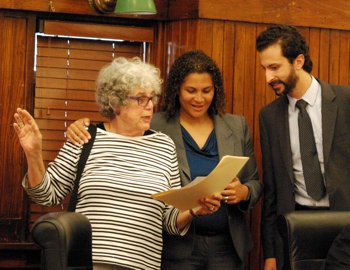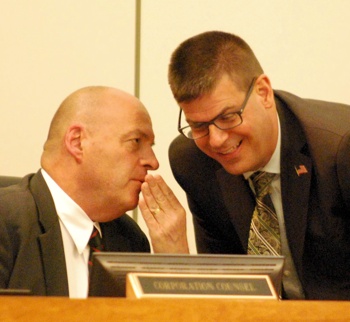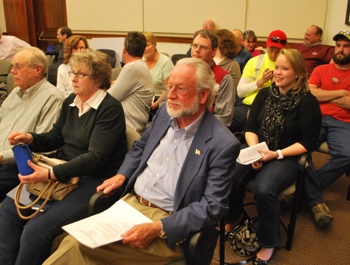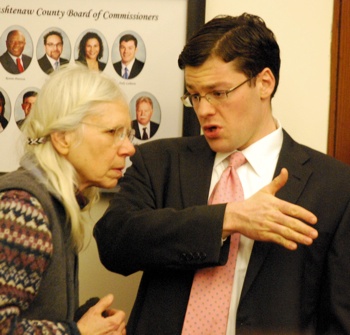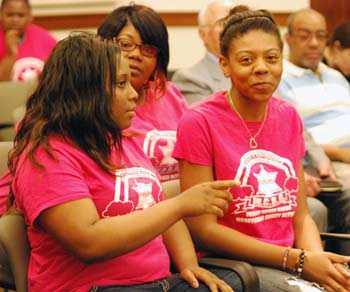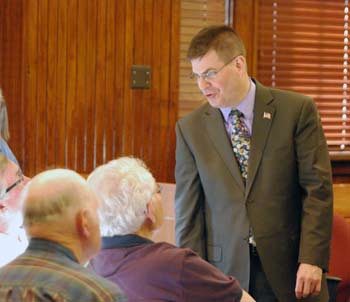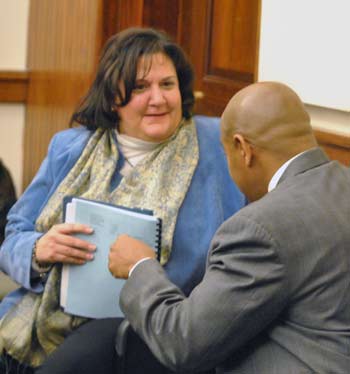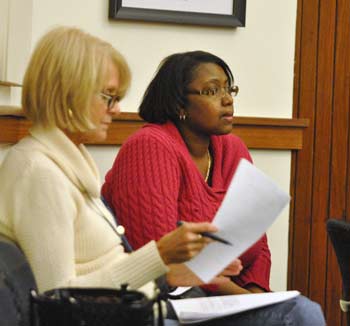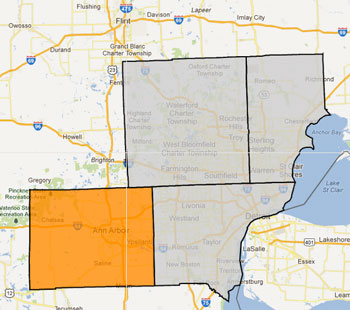County Concerned by Rise in Juvenile Crime
Washtenaw County board of commissioners meeting (July 9, 2014): An increase in violent crime committed by teens in Washtenaw County has spurred the need for additional funding from the county’s Child Care Fund. County commissioners have authorized using $642,707 from the Child Care Fund balance to pay for a range of services overseen by the county’s dept. of human services.
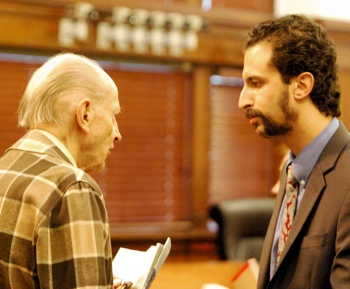
From left: former Congressman Wes Vivian talks with Washtenaw County board chair Yousef Rabhi (D-District 8) before the board’s July 9 meeting. Vivian is advocating for the board to put a proposal on the Nov. 4, 2014 ballot regarding the U.S. Supreme Court’s Citizens United ruling. (Photos by the writer.)
Linda Edwards-Brown, the county’s juvenile division administrator, told commissioners that there’s been an increase in young men “terrorizing” their communities. The sheriff’s office and court had started working together several months ago after they began observing an increase in gang-type activity, she said, including home invasions, firearm larceny, and assaulting police officers. They’d been hopeful that they could stem the tide of violence, she added, but it had escalated with a death in Ypsilanti earlier this summer.
So the sheriff’s office and court officials have reached consensus to remove some of these young men from the community and put them into residential facilities in other parts of the state, Edwards-Brown said. The juvenile division of the Washtenaw County trial court will place at least six youths in residential facilities this month, in addition to six youths who are currently in residential placements. According to a staff memo, residential placements are costly, with a typical length of stay at nine to twelve months.
At the July 9 meeting, commissioners and staff expressed the need to continue working on this issue as a community-wide effort.
In other action, commissioners were asked to pass a resolution making mid-year budget adjustments and allocating this year’s higher-than-expected property tax revenues, as well as putting the $3.9 million surplus from 2013 into unearmarked reserves.
The adjustments passed on a 6-2 vote, with Dan Smith (R-District 2) and Conan Smith (D-District 9) dissenting. Andy LaBarre (D-District 7) was absent. Dan Smith objected to spending more than was budgeted and making budget changes outside of the annual budget affirmation process, which takes place later this year. Conan Smith didn’t state his reason for voting against it on July 9, though in the past he has advocated for spending more of the surplus, rather than setting it aside in the fund balance.
Commissioners also authorized putting a proposal on the Nov. 4, 2014 ballot to renew a 10-year, 0.2353-mill countywide parks and recreation operations tax. They held public hearings related to other millages that the county plans to levy later this year: (1) for support of indigent veterans and their families; and (2) to fund economic development and agricultural activities, under Act 88. The hearings drew one speaker – Thomas Partridge.
Related to the health department, the board created a new board of health to help oversee public health services in the county. A state official was on hand to talk about the accreditation process that the Washtenaw County public health department completed earlier this year.
Commissioners voted to accept the recommendations of a task force that’s been working on a funding strategy to help end homelessness, and to sunset that task force. The board also made appointments to a new committee that’s charged with exploring funding options for road repair.
Several issues were raised during public commentary. Former Congressman Wes Vivian urged the county board to place a proposal on the Nov. 4, 2014 ballot enabling Washtenaw County voters to ask the state to support a constitutional amendment to overturn the Citizens United decision. That U.S. Supreme Court ruling has resulted in corporations “sloshing big money into our elections at all levels,” Vivian said.
Also during the meeting, commissioners honored Arthur Williams, who is retiring as principal of Huron High School in Ann Arbor after 19 years in that job. The board also passed proclamations welcoming the United Association (UA) of plumbers and pipefitters and the Ironworkers International. Both unions hold training programs in Washtenaw County each summer.
At the beginning of the meeting, Rabhi asked for a moment of silence in memory of Rowan David LaBarre, the newborn son of commissioner Andy LaBarre and his wife Megan LaBarre. Rowan David had passed away earlier in the week. “We all pray and hold Rowan in the light of our prayers and thoughts,” Rabhi said. [Full Story]




